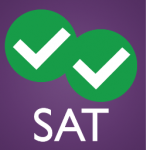 If you’ve taken the SAT before or done any studying, you probably realize that for the most part, SAT reading can be a bit dull. It depends on your taste, of course, but I don’t know many high-schoolers who really love reading about the political opinions of Frederick Douglass (who was badass, if you give him the chance). But it’s not all bad news—not if you like reading fiction, at least. There will always be a bit of fiction on your test, which can be a bit more enjoyable.
If you’ve taken the SAT before or done any studying, you probably realize that for the most part, SAT reading can be a bit dull. It depends on your taste, of course, but I don’t know many high-schoolers who really love reading about the political opinions of Frederick Douglass (who was badass, if you give him the chance). But it’s not all bad news—not if you like reading fiction, at least. There will always be a bit of fiction on your test, which can be a bit more enjoyable.
And enjoyable is a really, really good thing. Occasionally, I have students who think that they shouldn’t enjoy reading anything on the SAT, under the assumption that they’ll somehow be more diligent if they’re reading “seriously.” But really, the more you’re engaged with what you’re reading, the better you’ll understand it and remember the details after you finish. And that’s what SAT reading comprehension is all about. So when you hit that fiction excerpt, take a deep breath and enjoy it. Picture the characters in your head; try to identify with their personalities and feelings.
It’s not just the critical reading section, either. If you read fiction for fun, that can be a huge advantage during the SAT essay, too. If you know much about the essay, you’ve probably heard that it’s partly an exercise in how well you can fudge it. You don’t need to have facts, reliable sources, or anything even remotely authoritative to make your argument. You just need to tie a couple of well fleshed-out examples to your thesis and reasoning. And those examples can come from pretty much anywhere, including literature. It doesn’t matter that the people you’re writing about weren’t real people, or that the events you cite as evidence might be completely preposterous; that’s not what your writing is judged on. So make use of any and every story you know well. It helps to make a list before test day of the books that you can draw examples from. That way, you can mentally cycle through them as you plan your essay, instead of grasping blindly into your memory of everything you’ve ever read or heard. (Granted, it also helps to give examples from other realms as well—especially history or current events—so don’t limit that list to just fiction.)
Besides all that, simply put, the more you read, the more vocabulary you know. Well, maybe not if the epitome of your reading career is Dr. Seuss—”wumpus” will not be on your SAT, nor will “sneetches”—but as long as you’re reading books that are relatively age-appropriate, you’re bound to learn some new words here or there, and that can be massively helpful for sentence completion questions.
TL;DNR—You like fiction? Great. That helps you with reading comp, the essay, and vocabulary questions.
 Written by Lucas Fink, resident SAT expert at Magoosh, a leader in SAT Prep.
Written by Lucas Fink, resident SAT expert at Magoosh, a leader in SAT Prep.
You can learn more about Magoosh on our SAT blog, and you can get $50 off 1 month of prep here!



